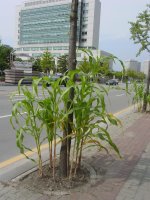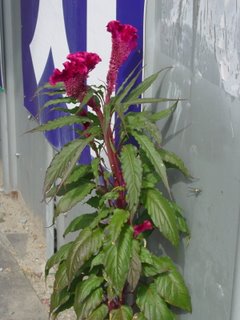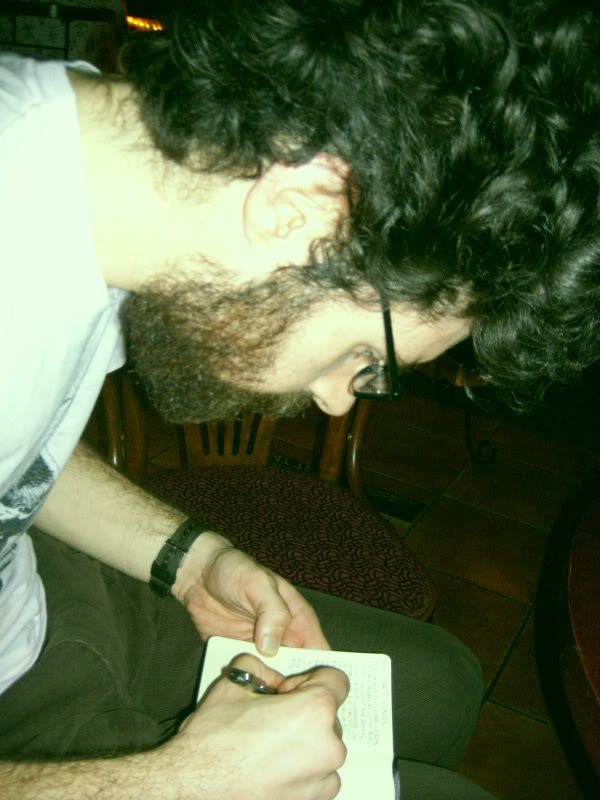
i think i've technically been a proponent of urban agriculture ever since, as a small child, my mother read me a story about a farmer who moves to the city and makes it beautiful by planting all kinds of wonderful things (by the way, if anybody knows the name of this book, please feel free to tell me). in the past seven years or so, i've taken this childhood fascination with a cute story and honed into a more or less coherent set of beliefs. chief among these beliefs is that we need to bring small scale agriculture back into our personal lives and into our cities. there are many reasons why this is an important practice to take up. first, a tremendous amount of energy goes into transporting food from where it is grown to where it is consumed. since the majority of the world's population lives in urban centers, producing food in these urban centers with save considerable amounts of energy in food transportation. second, producing even a small amount of your own food where you live allows you to eat healthier, fresher food, save money, and refrain from participating in the industrialization of farming. third, with a little creativity, there is an amazing amount of space that can be used for food production within urban centers. the more food there is produced in the city, the more land there is that could be returned to natural habitat for native plant and animal species. fourth, the act of gardening is really good for you. it clears your mind, gives you some exercise, and helps you to understand the cycles that allow energy from the sun to become the energy that sustains your life. finally, i just think that urban gardens look and are really cool.

for all this talk, i'm certainly not any kind of full-fledged city farmer, though i've certainly dabbled in urban agriculture. most notably, i had a rooftop garden just off the bustle of SE 39th ave in portland last summer, that was surprisingly productive. i also assisted mr. ian blazina in a highly sucessful garden in sellwood, and observed his wonderful efforts in recent years turning nearly his entire backyard into a lovely grounds of everything from hops to blueberries. overally, portland is an excellent city to observe and take part in urban agriculture. a stroll or bikeride down nearly any street of the city's east side will attest to this. however, for all of this gardening in the residential neighborhoods, seeing any kind of food crop growing downtown is nearly unheard of. truly urban urban agriculture is not really seen, even in portland.
in daejon, on the other hand, urban agriculture is EVERYWHERE. i'm not really sure why or exactly how this phenomenon occurs, but on a short walk around my neighborhood (which is in no way populated by houses with yards and gardens) you will see tons of food being grown. the most common crop you will find has got to be chili peppers. these things are literally growing everywhere in this town; in pots in front of restaurants, adjacent to parking lots, in the little dirt area in front of apatement buildings, everywhere. this could easily be explained by the amount of chili pepper used in korean food; the country probably needs to grow these things wherever possible just to create the alarming amount of spice koreans demand from every dish. the urban farming phenomenon extends far beyond chili peppers, however. there are several other crops that you will find in odd places, most notably strips of land between sidewalks and parking lots. you will most often see squash or pumpkin. a close second would have to be soybeans, followed by greenbeans, which are often grown up the stalks of corn plants. some sections of town have corn planted in with the trees along the sidewalks (depicted above), though this corn will never make it to harvest, and seems to be planted for more decorative than productive purposes. rooftop gardens are also quite popular.



aside from this slipping in of gardens to any available space, there is an interesting practice that i haven't quite gotten to the bottom of yet. there happens to be a lot of building in our neighborhood; it's kind of the "new downtown" of daejon. anywhere there is a lot of construction, there tends to be a lot of empty lots. here in daejon, those empty lots are full scale gardens with large plantings of crops. they don't appear to be community gardens, because they don't appear to be broken up into different plots. for the most part, it seems like just about anyone can wander through these gardens, though (but, a lot of people don't even lock their bikes here, either). occasionally, i'll see someone out working in these gardens when i'm out cruising around. if i spoke korean, i could just go and ask them what the deal is - who owns the garden, where the food goes, etc. but, well, i'm not quite to that level with my korean yet.



i will post updates as i find out more about this korean phenomenon, and discover new gardens. hopefully my korean will be sufficient enough by next spring that i can try to secure a little plot of land on which to do my own planting.


No comments:
Post a Comment